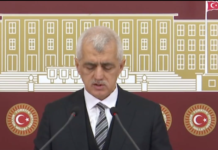Nebi Toylak, a former public school teacher summarily fired by the Turkish government in the aftermath of an abortive putsch in July 2016, was not allowed to attend a vocational course organized by the Turkish Employment Agency (İŞKUR) because he was a dismissed public servant, according to a report by Hacı Bişkin of the Gazete Duvar news website.
Toylak wanted to attend a greenhouse cultivation course to explore new career opportunities. He attended the course once and then received a telephone call from the provincial directorate of agriculture, which was putting the course on, telling him he could no longer attend the program.
Toylak contacted İŞKUR to learn why he was prevented from attending the course, to which they replied, “Because you were dismissed with a government decree.” Toylak said this was unacceptable and that as a Turkish citizen he had every right to attend a course sponsored by İŞKUR.
According to Toylak, he asked for a written statement that confirmed he could not attend the course because he was a dismissed public servant. İŞKUR told him this was not possible, upon which he wrote a petition to the directorate of agriculture demanding an explanation.
Toylak said he did not understand why as a citizen he could not benefit from such opportunities provided by the government. “This is causing me pain. What’s next? Are they going to prohibit dismissed public servants from voting? Are we not citizens of this country? If we are, then we want to be equal with others and access such opportunities as courses.”
Following the abortive putsch, the Turkish government declared a state of emergency and carried out a massive purge of state institutions under the pretext of an anti-coup fight. Over 130,000 public servants, including 4,156 judges and prosecutors as well as 20,571 members of the armed forces were summarily removed from their jobs for alleged membership in or relationships with “terrorist organizations” by emergency decree-laws subject to neither judicial nor parliamentary scrutiny.
Pro-Kurdish Peoples’ Democratic Party (HDP) deputy Ömer Faruk Gergerlioğlu raised Toylak’s case with Minister of Family, Labor and Social Services Zehra Zümrüt in a parliamentary question. Gergerlioğlu asked if the ministry could confirm whether dismissed public servants were being excluded from İŞKUR courses and if there were any regulations or laws directing them to do so.
Former public servants were not only fired from their jobs; they were also banned from working again in the public sector and getting a passport. The government also made it difficult for them to work formally in the private sector. Notes were put on the social security database about dismissed public servants to deter potential employers.
According to a joint report prepared by The Justice for Victims Platform and Gergerlioğlu, the purge caused immense suffering among public servants who were dismissed from their jobs by the government.
“The decree-law victims not only were removed from their jobs but also barred from seeking employment in the private sector and denied access to social security benefits,” said Gergerlioğlu.
The dismissed civil servants lost 70 percent of their average monthly income, a circumstance that reduced them to dire financial straits, according to a survey conducted for the joint report.
Apart from economic difficulties they also faced further exclusions and bans. The Turkish parliament’s executive board on the first day of the new legislative year voted to forbid former employees of parliament who were dismissed from their jobs after January 1, 2015 from entering the parliament premises.
The regulation was proposed as part of changes to parliament’s security measures and was adopted with a majority of votes.
The survey indicates that 99.1 percent of the victims are college or university graduates or holders of master’s or doctoral degrees, which means an immense loss of human resources for Turkey’s public administration.
According to the victims’ family members taking part in the survey, the biggest problem they have been facing is economic hardship (97.9 percent) followed by psychological problems (88.6 percent), loss of social prestige and social exclusion (83.7 percent), disintegration of social circles (83.1 percent), unemployment/lack of employment (80.4 percent) and lack of social security (73.2 percent), respectively.
















[…] Nebi Toylak, a former public school teacher summarily fired by the Turkish government in the aftermath of an abortive putsch in July 2016, was not allowed to attend a vocational course organized by the Turkish Employment Agency (İŞKUR) because he was a dismissed public servant. More.. […]